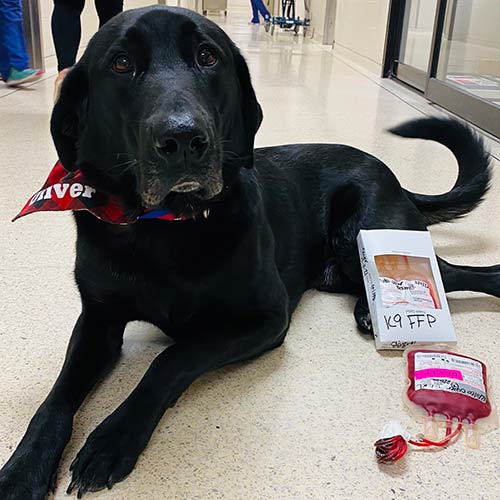February 17, 2021
Local dogs donate blood to save canine lives

Just like humans, our canine friends can donate lifesaving blood products to other dogs in need.
The Kansas State University Veterinary Health Center, or VHC, manages a community-based, volunteer canine blood-donor program, established in 2015. The hospital's blood bank collects, processes and stores canine blood needed for transfusions to treat a variety of conditions in dogs.
More than 70 canine donors have been a part of the program since its creation. The donors are typically owned by VHC staff, students and area residents.
"Just like in people, blood transfusions can be crucial for many of the canine patients staying in the hospital," said Brooke Neiberger, veterinary nurse and head of the donor program. "Having the blood on hand really helps, as many patients are in life-threatening conditions when they arrive."
Common dog emergencies that may require blood are poisoning, trauma, injuries, autoimmune hemolytic anemia, clotting disorders and surgeries.
"The unit of blood is collected from the jugular vein in the neck since this is the most accessible site for venipuncture in the dog," Neiberger said. "The dogs lie quietly on a table for about five to 10 minutes during the collection process and are praised and petted to provide comfort and positive feedback. After collection, a temporary bandage is placed around the neck covering the venipuncture site and the unit of canine blood is separated into red blood cells and plasma. This processing supplies enough blood for two patients."
Currently, part of the VHC's blood supply must be ordered from an outside location because the supply of volunteer donations can't keep up with demand. When ordering from outside, there is more than 10-week waiting period from the time the blood is ordered until it arrives at the VHC.
"The volunteer blood donor program helps to meet the transfusion needs of the patients here at the VHC," Neiberger said. "The demand for blood products for our patients increases every year, which then increases the need for more volunteer blood donors to ensure that every patient in need can be treated."
The goal of the program is to grow the number of canine blood donors and to eventually have entirely universal donors — donors that have a negative blood type — to increase the blood supply at the VHC. Donors in the program can donate once every two months.
"Similar to humans, to be an eligible blood donor, dogs must be in good general health," Neiberger said. "All prospective canine donors must be friendly — calm — while being cooperative without their owner's present."
Other requirements to donate include:
- Dogs must be 1-5 years old and heavier than 55 pounds to donate safely.
- Donors must be current on their required vaccinations and be free of any medications other than flea, tick and heartworm preventatives.
- Females need to have no history of pregnancy while males must be neutered.
- Dogs that have previously received a blood transfusion will not qualify for the program.
- Donors would preferably be available for collection once every two months.
Owners of blood donors receive benefits from enrolling their dogs in the program as well, including a bag of food after each donation, flea and tick preventatives, heartworm preventatives, yearly vaccinations and yearly blood work.
If you think your dog might be a good fit for the program, you can visit the Canine Blood Donor site for more information, or contact the program at vhcblooddonor@vet.k-state.edu.
